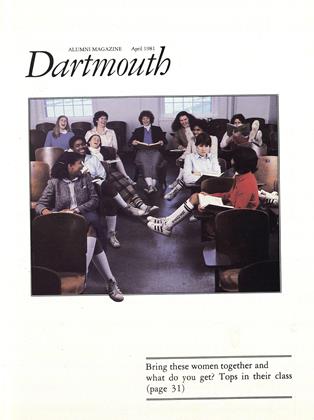STAYING POWER: Performing Artists Talk About Their Lives by Peter Barton '63 Dial, 1980. 224 pp. $9.95
Someone in business who is devoted to work to the exclusion of all else in life is a workaholic. Someone in the arts who is devoted to work to the exclusion of all else in life is the norm.
That is the message, cast in negative terms, of the book Staying Power, a series of interviews with 12 young performing artists. But the book's message is not a negative one. It is, rather, a paean to the incredible dedication, enthusiasm, energy, training, talent ― and luck ― that lie behind a single well-executed arpeggio, plie, or monologue.
The 12 artists ― four each from the worlds of music, dance, and theater ― talked about their lives candidly and articulately with author Peter Barton. Their own words are augmented with a brief editorial passage and two or three photographs of each artist.
There are differences between the 12 in background, personality, style, philosophy. But these are differences that would be found in virtually any group of 12 people. The main focus of the book is on what they possess in common: a "staying power" that sustains them through the agonies and defeats to the thrills and rewards of their chosen careers.
They need to fight the belittling attitude of parents toward their work. They need to fight the suspect attitude toward the arts held by some members of society. They need to fight the battle of economic survival ― waiting on tables and driving cabs to augment meager professional incomes. They need to fight pain and fatigue in bodies that they are pushing to the limit. They need to fight depression during low points in their careers. They need to fight other young artists just as determined to succeed as they are.
But all 12 have chosen to stay in the battle. What is the source of the staying power that keeps them there? Within themselves or in the character of their work? Probably it derives from some combination of the two, but it seems to be perhaps a little more dependent on their work than on themselves.
If it were because of some common personality trait, these men and women would presumably be driven souls in any field. But it is hard to picture any of them being constrained by, let alone successful at, a more traditional occupation. It is hard to picture any of them as a workaholic at I.B.M.
Yet they are undeniably music, dance, or theater workaholics. So their staying power must have more to do with their work than with themselves. Perhaps it is because their work is more a hobby ― in their feelings for it if not in the time they devote to it ― than most people's work. Or perhaps because their business is giving pleasure, they get pleasure in return.
But whatever the reason, the 12 artists are in- tensely absorbed, in their work. And author Barton has so skillfully conveyed that sense that the book itself is an absorbing one.
A frequent writer on the arts at Dartmouth,Dana Grossman has been a member of theHopkins Center staff and an assistant editor ofthe ALUMNI MAGAZINE.
 View Full Issue
View Full Issue
More From This Issue
-
 Feature
FeatureTenure: an academic necessity
April 1981 By A. E. DeMaggio -
 Feature
FeatureQuestion: Who are the Arts for and, Indeed, Who Owns Dartmouth?
April 1981 By Peter Smith -
 Feature
FeatureTenure: the tragedy of the slaughterhouse
April 1981 By Peter W. Travis -
 Cover Story
Cover StoryTops in Their Class
April 1981 -
 Cover Story
Cover StoryChargé d'Affaires
April 1981 -
 Cover Story
Cover StoryBeethoventorte
April 1981
Dana Cook Grossman
-
 Article
ArticleVox
October 1980 By Dana Cook Grossman -
 Article
ArticleQuirkiness to Taste
December 1980 By Dana Cook Grossman -
 Feature
FeatureWhat keeps them going? A 'Mystic Glue' Perhaps
MAY 1982 By Dana Cook Grossman -
 Article
Article"More like a house"
OCTOBER 1984 By Dana Cook Grossman -
 Article
ArticleA Post-game Peregrination
OCTOBER 1984 By Dana Cook Grossman -
 Article
ArticleCollege to purchase hospital buildings
JANUARY/FEBRUARY 1986 By Dana Cook Grossman
Books
-
 Books
BooksBusiness Employments
November, 1916 -
 Books
BooksAlumni Articles
December 1960 -
 Books
BooksTHE SYSTEMATIC THEOLOGY OF PAUL TILLICH: A REVIEW AND ANALYSIS.
JULY 1965 By DAVID H. KELSEY -
 Books
BooksPOEMS FROM THREE DECADES.
DECEMBER 1972 By DONALD O'HARA '53 -
 Books
BooksWHO'S ZOO IN THE GARDEN
June 1941 By Herbert F. West '22 -
 Books
BooksNotes on justice finally done and old tales long in the telling.
May 1977 By R.H.R. '38

